For many dog lovers, the joy of companionship can often be tempered by the constant battle against dog hair. If you dream of a furry friend but dread the thought of daily vacuuming and lint rolling, you’re in the right place. Owning a dog that sheds minimally or not at all can transform your home environment, making it cleaner and more allergy-friendly. But beyond the low-shedding coat, finding a dog with a gentle disposition and trainable nature – a truly “well-behaved” companion – is equally important for a harmonious household. This guide explores some of the most charming small, well-behaved dogs that don’t shed, helping you discover which breed perfectly fits your lifestyle.
Choosing the right canine companion means looking beyond just their adorable looks. It involves understanding their temperament, exercise needs, and grooming requirements to ensure a happy life for both you and your pet. Whether you live in an apartment, have allergies, or simply prefer a tidy home, a small, well-behaved, non-shedding dog offers a compelling solution. For those exploring various breeds, including those known for their lively spirit like the fox terrier puppies, understanding specific needs is key to a successful adoption.
Why Choose a Small, Well-Behaved, Non-Shedding Dog?
The appeal of small dogs that don’t shed extends beyond just cleanliness. These breeds often boast a range of characteristics that make them ideal companions for a variety of households:
- Allergy-Friendly: Many non-shedding breeds are also considered hypoallergenic, producing less dander, which is often the primary trigger for pet allergies.
- Apartment Living: Their smaller size and often moderate energy levels make them well-suited for smaller living spaces, provided they receive adequate exercise.
- Reduced Odor: Breeds with hair (rather than fur) often have less “doggy odor,” contributing to a fresher home.
- Manageable Grooming: While they require regular grooming, the absence of shedding means less hair around the house, making coat maintenance more focused and predictable.
- Ideal Temperament: When we talk about “well-behaved,” we’re looking for dogs that are intelligent, eager to please, good with families, and adaptable to various routines. Many of the breeds listed below fit this description, making them a joy to train and live with.
Our Top Picks: Small, Well-Behaved Dogs That Don’t Shed
Here’s a detailed look at delightful small dog breeds renowned for their minimal shedding and charming personalities:
Affenpinscher
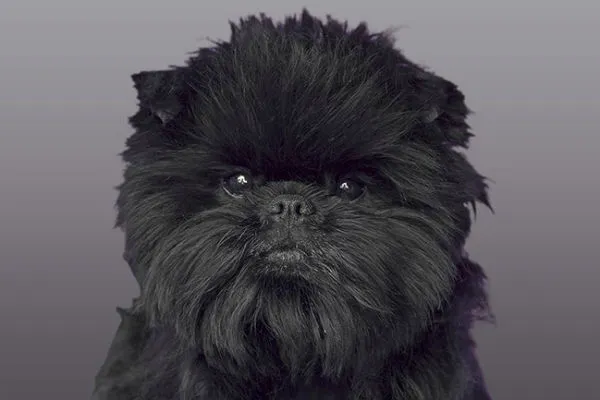 Affenpinscher dog looking curious
Affenpinscher dog looking curious
The Affenpinscher, whose name means “monkey-like terrier,” is a spirited and intelligent toy breed known for its distinctive facial hair and confident demeanor. Despite their small stature, these dogs are famously fearless and alert, making them excellent little watchdogs without being overly yappy. Their wiry coat sheds very little and has minimal doggy odor, requiring only a twice-weekly brushing to stay neat. Affenpinschers are celebrated for their sense of humor and affectionate nature towards their families, proving that a well-behaved dog doesn’t have to be dull.
Basenji
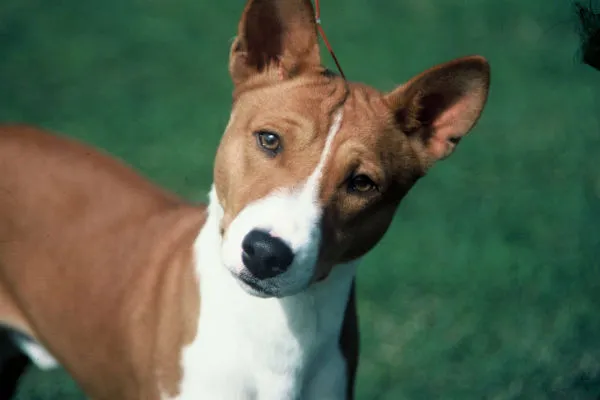 Basenji dog standing gracefully outdoors
Basenji dog standing gracefully outdoors
Often called the “barkless dog,” the Basenji is an excellent choice for those who appreciate the hound personality but prefer a quiet, low-shedding companion. Their short, fine coat requires minimal care beyond occasional brushing, contributing to their reputation as a very clean dog. Basenjis are intelligent and independent, possessing a unique charm that thrives on daily exercise and mental stimulation. With consistent training and plenty of playtime, these well-behaved pups can make ideal apartment dwellers and devoted family members.
Bichon Frise
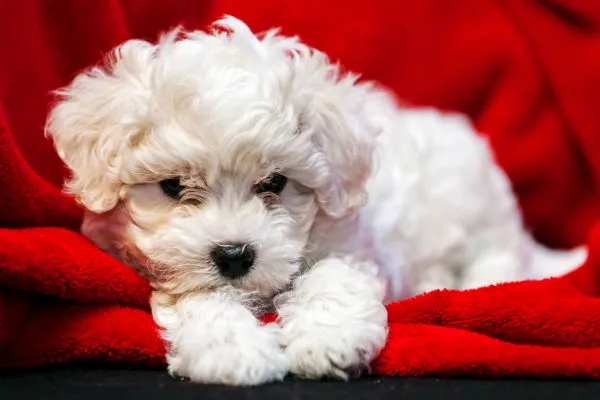 Fluffy white Bichon Frise sitting happily
Fluffy white Bichon Frise sitting happily
The Bichon Frise is the quintessential non-shedding small dog breed, making them a top choice for individuals with allergies. These playful and affectionate dogs are known for their cheerful disposition and eagerness to please, which makes them generally easy to train and truly well-behaved family members. While they don’t shed, their continuous-growing, powder-puff coat demands regular grooming, brushing, and occasional baths to prevent mats and maintain their pristine appearance. Their charming personality more than makes up for the grooming commitment.
Bolognese
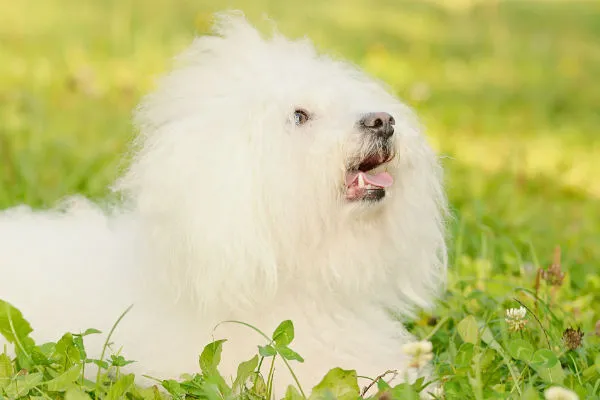 Bolognese dog with long, fluffy white coat
Bolognese dog with long, fluffy white coat
Similar to the Bichon Frise, the Bolognese boasts a distinctive fluffy coat composed of hair rather than fur, ensuring it does not shed. These lovable lap dogs are calm, devoted, and intelligent, making them a wonderfully well-behaved and adaptable companion for various households. They thrive on companionship and are generally quiet and easygoing. Daily grooming is essential to keep their non-shedding coat free of tangles and looking its best, making it a ritual that strengthens the bond between pet and owner.
Brussels Griffon
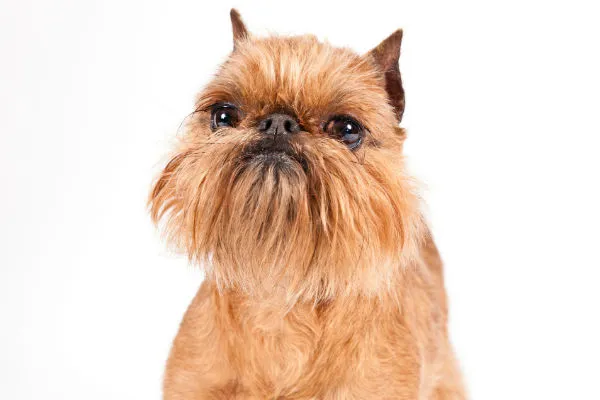 Brussels Griffon looking attentively
Brussels Griffon looking attentively
The Brussels Griffon, with its distinctive human-like expression, is a small dog with a big personality. Available in both smooth-coated and rough-coated varieties, both types are minimal shedders. These intelligent and sensitive dogs thrive on companionship and are known for their loyalty and playful nature, making them delightful family pets. Their compact size means a daily walk and indoor play are usually sufficient for their exercise needs. Consistent, positive training is key to nurturing their well-behaved potential, especially for those considering toy fox terrier adoption or other terrier breeds.
Chinese Crested
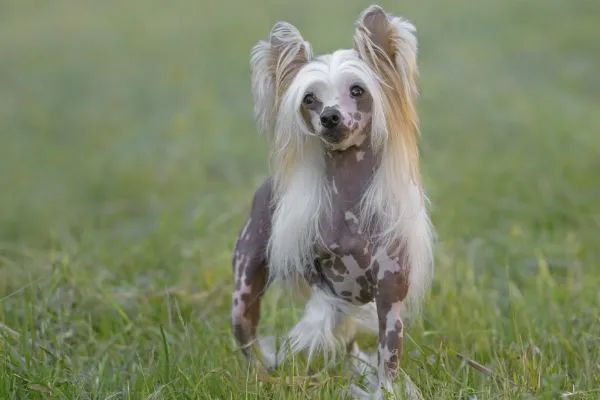 Hairless Chinese Crested dog with hair on head and tail
Hairless Chinese Crested dog with hair on head and tail
For the ultimate in low-shedding, the Chinese Crested offers a unique solution. This breed comes in two types: the Hairless, which has hair only on its head, tail, and feet, and the Powderpuff, covered in a fine, silky coat that sheds very minimally. Both varieties are highly affectionate, playful, and intelligent, making them charming and well-behaved companions. Hairless varieties require extra skin care for sun and cold protection, while Powderpuffs need regular brushing. Their agreeable temperament makes them suitable for many homes.
Coton De Tulear
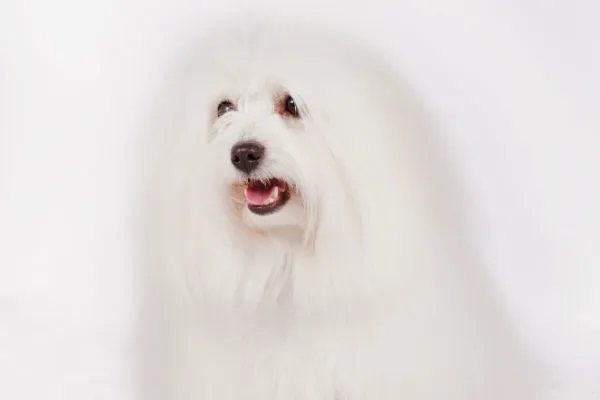 Coton de Tulear with long, white, cotton-like fur
Coton de Tulear with long, white, cotton-like fur
The Coton de Tulear, named for its cotton-like coat, is a joyful and intelligent companion known for its minimal shedding and hypoallergenic qualities. These dogs are affectionate, gentle, and highly adaptable, fitting well into various family dynamics. Their lighthearted and social nature makes them eager to please and generally easy to train, resulting in a wonderfully well-behaved pet. While daily grooming is necessary to maintain their beautiful coat, the effort is well worth it for such a delightful and low-shedding friend.
Havanese
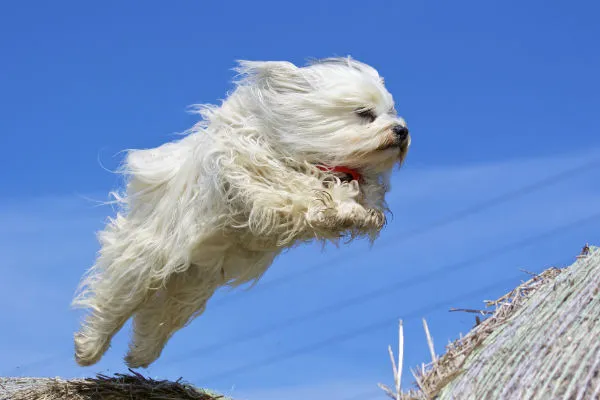 Havanese dog with long, wavy fur
Havanese dog with long, wavy fur
Native to Cuba, the Havanese charms owners with its spunky personality and a non-shedding coat. These intelligent and outgoing dogs are known for their affectionate nature and love of play, making them excellent family pets. They are eager to please and respond well to positive reinforcement, contributing to their reputation as well-behaved companions. Weekly brushing and regular baths keep their coat healthy and clean, ensuring more time for romping and less time spent on lint rollers.
Maltese
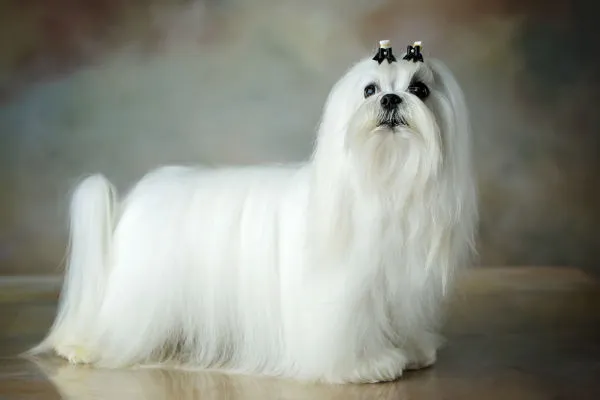 Maltese dog with flowing white hair
Maltese dog with flowing white hair
With a history spanning three millennia, the Maltese has long been a beloved lap dog. Their long, silky white coats shed very little, making them ideal for those seeking a clean home. Maltese are known for their gentle, sweet, and playful demeanor, thriving on human companionship. They are intelligent and generally respond well to training, embodying the “well-behaved” qualities sought after in a small companion. Regular brushing is crucial to prevent mats in their exquisite coats.
Lhasa Apso
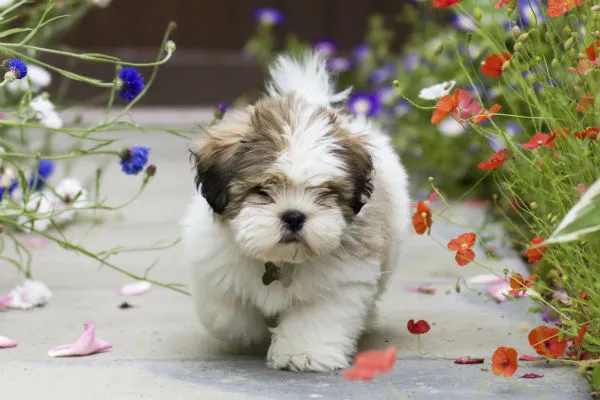 Lhasa Apso dog with long hair over its face
Lhasa Apso dog with long hair over its face
Originating from Tibet, the Lhasa Apso is a sturdy and confident small dog that makes an excellent companion. While they don’t shed, their long, flowing double coat requires consistent maintenance. Many owners opt for a “puppy cut” to simplify grooming. Lhasa Apsos are known for their calm yet playful nature and their unwavering loyalty to their families. With proper socialization and training, they are well-behaved, alert companions who enjoy both brisk walks and relaxing on their owner’s lap.
Miniature Schnauzer
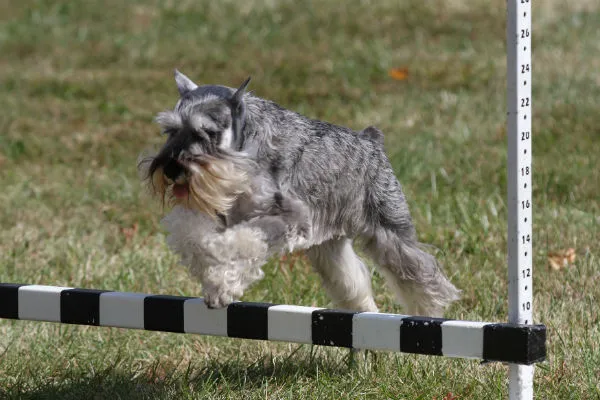 Miniature Schnauzer with characteristic beard and eyebrows
Miniature Schnauzer with characteristic beard and eyebrows
The Miniature Schnauzer is a smart, trainable, and cheerful terrier that sheds very little. Their distinctive wiry coat requires weekly brushing and regular grooming to keep them looking their best. These adaptable dogs are equally at home in the city or country, as long as they are close to their people. Known for their spirited yet affectionate nature, Miniature Schnauzers are eager to learn and excel in various dog sports, making them a fantastic choice for active families looking for a well-behaved, low-shedding companion. For those comparing dog breed pricing, understanding the costs associated with specific breeds is often a consideration, whether it’s dog breed pricing in various regions or other factors.
Poodle (Miniature and Toy)
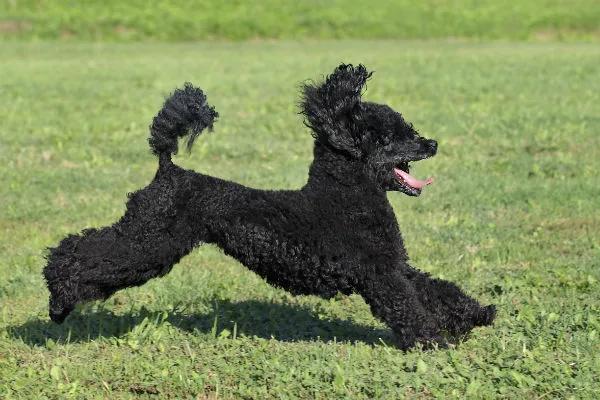 Toy Poodle with a playful expression
Toy Poodle with a playful expression
Poodles are perhaps the most famous of the non-shedding, hypoallergenic breeds. Miniature and Toy Poodles offer these desirable qualities in a petite, highly intelligent package. Renowned for their exceptional trainability and proud demeanor, Poodles are active and eager to please, making them one of the most well-behaved dog breeds. Their curly hair does require regular professional grooming and daily brushing to prevent matting, but the minimal shedding makes them a top choice for allergy sufferers and those seeking a clean home. If you’re looking for an affordable miniature poodle or any size, prepare for their grooming needs.
Scottish Terrier
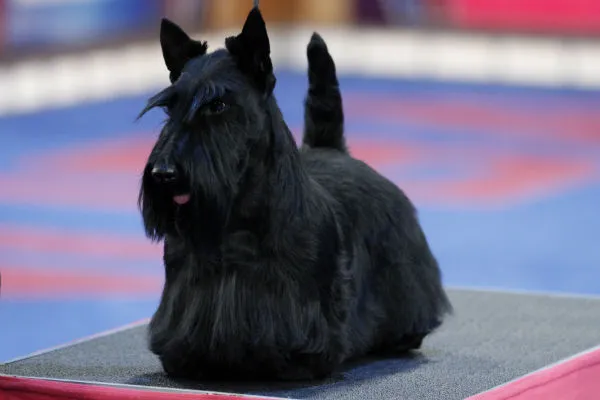 Scottish Terrier sitting attentively
Scottish Terrier sitting attentively
The Scottish Terrier, or Scottie, is a bold and confident terrier with a big personality. Their wiry, weather-resistant coat sheds very little but requires regular brushing, grooming, and occasional hand-stripping to maintain its health and distinctive outline. Scotties are clever and independent, known for their loyalty and courageous spirit. With consistent training and early socialization, these small but mighty dogs can be well-behaved companions who enjoy family life while retaining their charming terrier quirks.
Shih Tzu
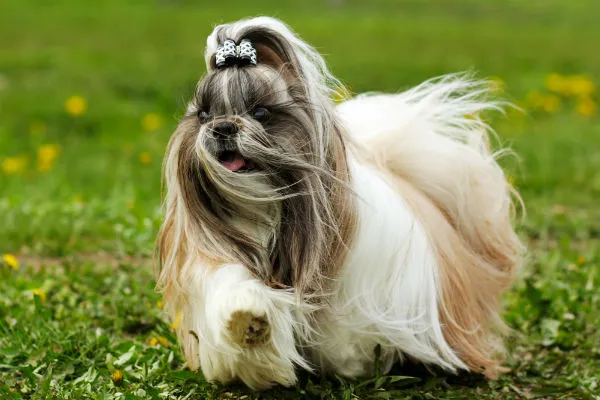 Shih Tzu with long, elegant fur
Shih Tzu with long, elegant fur
The Shih Tzu, a favored pet of the Tang Dynasty, is truly a “little lion dog” with a long and regal history. Their long, silky hair is very low-shedding and looks magnificent when properly groomed. Bred specifically as house pets, Shih Tzus possess a gentle, trusting, and outgoing nature, making them exceptional and well-behaved companions. They are sturdy, lively, and thrive on human interaction, proving that a non-shedding dog can also be full of personality and grace.
West Highland White Terrier
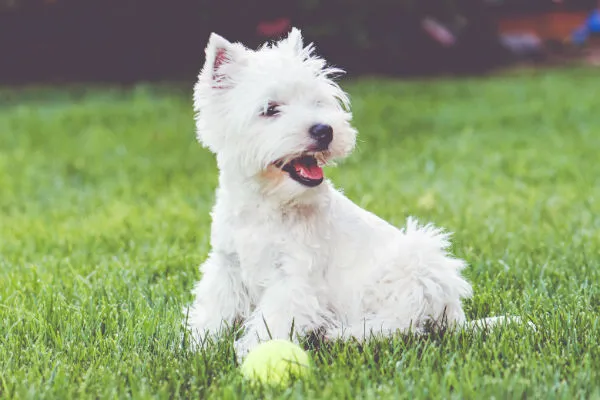 West Highland White Terrier with alert expression
West Highland White Terrier with alert expression
Affectionately known as Westies, West Highland White Terriers boast a coarse, white coat that sheds very little. These sturdy little dogs are intelligent, loyal, happy, and highly entertaining. They possess a curious nature and moderate energy levels, coupled with an independent streak common among terriers. While their spirited nature can present a fun challenge during training, consistent positive reinforcement leads to a well-behaved and devoted family member. Their minimal shedding makes them a popular choice for those seeking a cleaner home.
Xoloitzcuintli (Mexican Hairless)
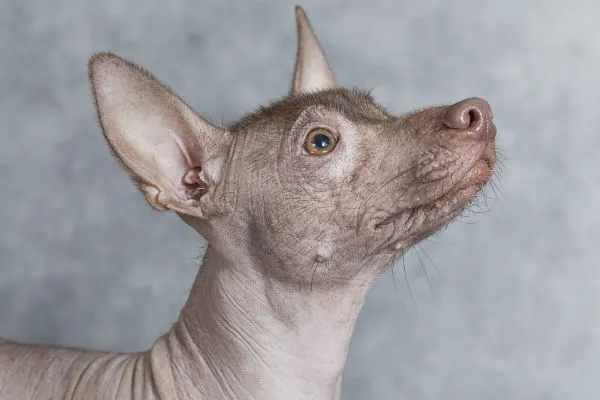 Hairless Xoloitzcuintli dog looking calm
Hairless Xoloitzcuintli dog looking calm
The ancient and rare Xoloitzcuintli, or Mexican Hairless dog, offers a unique low-shedding option. They come in both hairless varieties (with minimal hair on the head) and coated varieties (with a very short, fine coat that sheds minimally). Xolos are known for their tranquil personality around the home, making them attentive watchdogs and affectionate companions. Like other hairless breeds, their skin requires extra attention to protect from elements. Their calm and adaptable nature contributes to their reputation as well-behaved pets.
Yorkshire Terrier
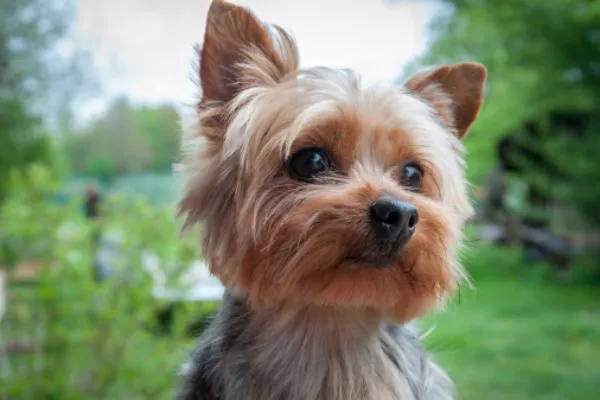 Yorkshire Terrier with silky topknot
Yorkshire Terrier with silky topknot
The Yorkshire Terrier, or Yorkie, is a spunky, affectionate toy breed packed with personality. These fearless little dogs do not shed, and their silky coats are beautiful when brushed daily. Despite their regal carriage, Yorkies have working-class roots, having hunted rats in English mills. Today, they are just as happy to sit on a lap as they are to engage in playful antics. Their intelligence and eagerness to please make them highly trainable and wonderfully well-behaved companions, solidifying their place as one of the most popular small dog breeds.
Beyond the Breeds: Important Considerations for Your New Companion
Choosing a small, well-behaved dog that doesn’t shed is just the first step. To ensure a successful and happy life together, consider these essential aspects of pet ownership:
- Grooming is Still Key: Even non-shedding breeds require regular grooming. Their hair grows continuously and needs brushing to prevent mats, and often professional trimming every few weeks. Establish a consistent grooming routine early on.
- Training for a Well-Behaved Pet: All dogs, regardless of breed, benefit from consistent training and socialization. Enroll in puppy classes, use positive reinforcement, and ensure your “small well-behaved dogs that don’t shed” learn good manners and cues. This builds a strong bond and prevents behavioral issues.
- Socialization and Exercise: Small dogs still need daily exercise to stay healthy and happy. Whether it’s a brisk walk, indoor playtime, or interactive toys, ensure their physical and mental needs are met. Early socialization with other dogs and people is also crucial for developing a confident and well-adjusted temperament. When considering breeds, even active ones like those producing blue merle miniature Australian Shepherd puppies, understanding their energy levels is paramount.
- Choosing a Reputable Breeder or Adoption Agency: To avoid health problems and ensure you’re getting a dog with a good temperament, always acquire your pet from a reputable breeder who prioritizes health and ethical breeding practices, or consider adoption from a well-regarded rescue organization.
- Health and Veterinary Care: A high-quality diet, regular veterinary check-ups, and preventative care are vital for your dog’s long-term health. Discuss specific nutritional and health needs with your vet.
Conclusion
Finding a small, well-behaved dog that doesn’t shed is a dream come true for many dog lovers seeking a clean home and a delightful companion. From the playful Bichon Frise to the dignified Poodle, the breeds listed above offer a fantastic blend of low-shedding coats and charming temperaments. Remember, while these breeds naturally shed less, they still require commitment to grooming, training, and overall care. By carefully researching and choosing the right breed that matches your lifestyle, you’re sure to welcome a loving, well-behaved, and low-maintenance friend into your home for years to come.
